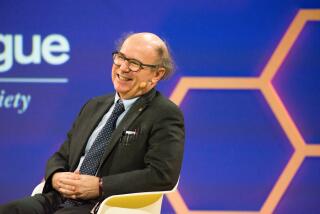What Do They Know?
- Share via
Physics in the 20th Century has done a lot for physics, to be sure, but it has knocked cosmology and philosophy into a cocked hat. Many of the architects of the quantum revolution--starting with Albert Einstein--have been troubled by the meaning of their discovery, or, to be more precise, by the lack of meaning of quantum physics. One of the puzzles of physics and philosophy is to explain what in the universe quantum mechanics describes. It works very well, but what does it mean?
Classical physics at least had the advantage of providing a neat model of the universe. But quantum physics is based on statistics and probability. (The word quantum comes from the fact that in quantum physics many elementary units come in fixed, indivisible quantities and never have fractional amounts. From the Latin quantus , how much?)
The philosophical significance of the theory is that it says that a certain amount of uncertainty is built into nature. At the same time, however, the large objects that we observe in the universe all behave according to classical mechanics, and no one is sure what to make of that, either. Inquiring minds want to know how classical mechanics can be generated from quantum mechanics.
Physicists don’t have much of a clue, though they do think about the question, and, for physicists who care to do it, thinking about the anomalies of contemporary physics can be a full-time job. Even though the mathematics works like a charm, the theory leaves much to be desired. This is particularly true in the world of cosmology--the effort to understand the structure and evolution of the universe. If quantum mechanics must explain everything, it must explain how this particular universe got to be here. There are guesses, but little more. The results are shaky.
Nor can a full description be made of the present universe. For one thing, quantum theory seems to require that the universe contain places where the laws of physics themselves don’t hold--”singularities,” they’re called--but Stephen Hawking of Cambridge University in England, one of the world’s foremost theoretical physicists, told a recent meeting at the Fermi National Accelerator Laboratory near Chicago that he thinks the universe can be constructed without such singularities. At one point Hawking said, “If the universe is not in the ground (a particular) state, science cannot predict the universe. The rest is up to God.”
The true state of affairs was summed up at the meeting by Yakov B. Zeldovich of the Institute for Cosmic Investigations of the U.S.S.R. Academy of Sciences in Moscow, who asked in exasperation: “What has all this got to do with observable reality?”
Remember, these are physicists, not mystics, but modern physics seems to have that effect on many of its practitioners. One of the puzzles of knowledge is that the more you know, the less you understand.





